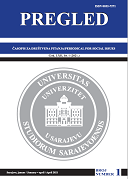DEJTONSKI MIROVNI SPORAZUM I POLITIČKE REFORME U TRANZICIJI BOSANSKOHERCEGOVAČKOG DRUŠTVA
DAYTON PEACE AGREEMENT AND POLITICAL REFORMS IN THE TRANSITION OF BOSNIAN SOCIETY
Author(s): Hoda DedićSubject(s): Constitutional Law, Military history, Political history, International relations/trade, Transformation Period (1990 - 2010), Present Times (2010 - today), Peace and Conflict Studies, Wars in Jugoslavia
Published by: Univerzitet u Sarajevu
Keywords: Bosnia and Herzegovina; European Union; Dayton Peace Agreement; Constitution of Bosnia and Herzegovina; consensus; reforms; international community;
Summary/Abstract: Since the signing of the Dayton Peace Agreement in December 1995, the state of Bosnia and Herzegovina has undergone specific processes of social and political development. In the period of post-Dayton political development of Bosnia and Herzegovina, important reforms were carried out which enabled not only the consolidation of peace in Bosnia and Herzegovina in the past 25 years, but also the building of institutions of the state of Bosnia and Herzegovina. In this process, the role of the international community and the European Union, expressed through the High Representative for Bosnia and Herzegovina and the EU Special Representative in Bosnia and Herzegovina, appears as a special form of international intervention within the geopolitical framework for building and consolidating peace under the Dayton Peace Agreement. In the first years of the implementation of the Dayton Peace Agreement, important elements of Bosnian statehood were established by decisions and laws imposed by the High Representatives for Bosnia and Herzegovina on the basis of the Bonn powers. Bosnia and Herzegovina has been given national symbols: a flag, a single currency, as well as common license plates. The constitutions of the entities are harmonized with the Constitution of Bosnia and Herzegovina. The Court of Bosnia and Herzegovina was established. Defense and intelligence reforms have been implemented in Bosnia and Herzegovina. The competencies of state-level institutions have been expanded and the number of ministries in the Council of Ministers of Bosnia and Herzegovina has increased. Comprehensive reforms have also been implemented in the process of meeting the criteria for BiH's full membership in the European Union. The process of European integration, through broad political, economic and reforms in the field of justice and the rule of law has in itself generated positive social changes. In the further integration process, Bosnia and Herzegovina will implement 14 priorities from the Opinion of the European Commission. Due to the complexity of building a political consensus on important issues that determine the stable political development and European future of Bosnia and Herzegovina, the political and technical assistance of the EU Special Representative is necessary in order for Bosnia and Herzegovina to receive a recommendation to open accession negotiations by the end of 2021.
Journal: PREGLED - časopis za društvena pitanja
- Issue Year: LXII/2021
- Issue No: 1
- Page Range: 185-201
- Page Count: 17
- Language: Bosnian

